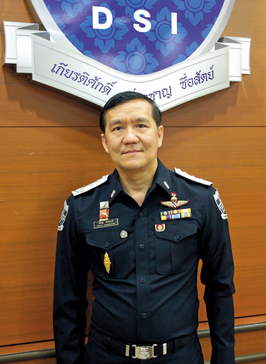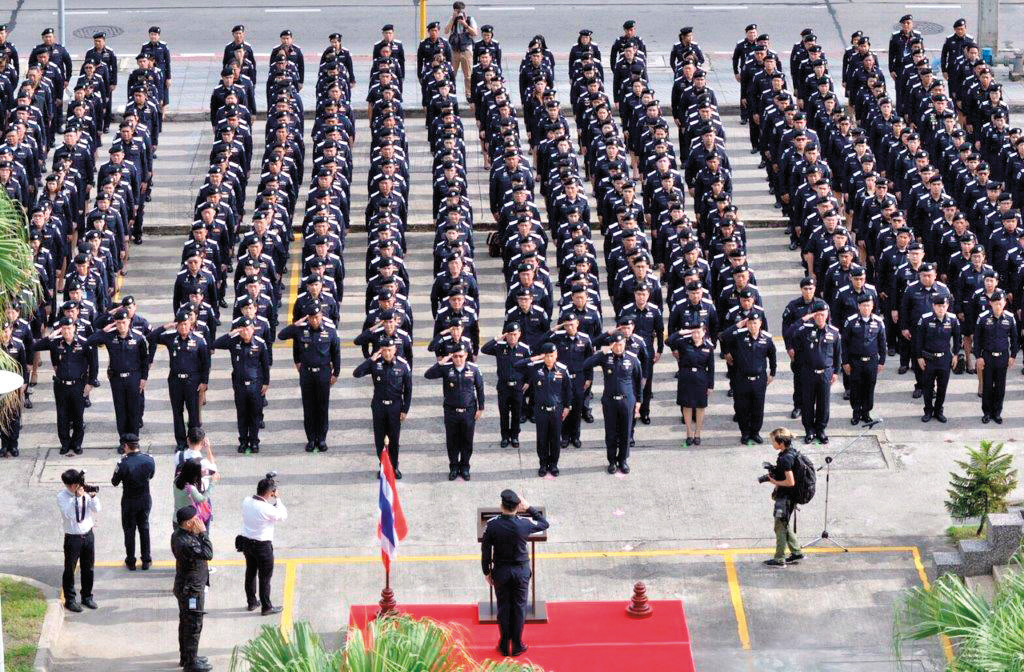Thanks to greater international cooperation, it’s much easier for the Department of Special Investigation (DSI) to detect crime and obtain evidence, so watch out those foreigners involved in crimes ranging from passport forgery, call centre scams, credit card fraud and illicit drugs to the sexual exploitation of children and even murder
Maxmilian Wechsler talks to Director of Bureau of Foreign Affairs and Transnational Crime

MY message to foreign criminals who plan to come to Thailand to do their dirty work is, think again! If you commit a crime here you’ll be caught and thrown in jail,” said Paisith Sungkahapong, Director of the Bureau of Foreign Affairs and Transnational Crime (BFATC) under the Department of Special Investigation (DSI). Mr Paisith acknowledged that in years past Thailand was regarded as a safe haven for foreigner criminals and fugitives, but he emphatically asserts that those days are over.
“The DSI is now a highly efficient, effective, and well equipped law enforcement organisation and we work closely with many foreign counterparts. This allows us to gather information on foreign criminals and fugitives more easily and it allows us to find them easily if they enter the country.” Director Paisith has been with the DSI since the civilian agency under the Ministry of Justice was formed in 2002. He held several key posts and achieved the civil service rank of C9 before he was appointed BFATC Director in July 2015. He recently made time in his busy schedule to talk to The BigChilli at the high-rise DSI headquarters on Chaeng Wattana Road. He was wearing the new dark blue DSI uniform which is not yet familiar to the general public.
“We have been trying to update our uniforms for years and the government finally approved this design in September. Every DSI officer is obliged to wear the uniform on Mondays, for special occasions and ceremonies and when conducting the operations.”
“The DSI is now a highly efficient, effective, and well equipped law enforcement organisation and we work closely with many foreign counterparts. This allows us to gather information on foreign criminals and fugitives more easily and it allows us to find them easily if they enter the country.” Director Paisith has been with the DSI since the civilian agency under the Ministry of Justice was formed in 2002. He held several key posts and achieved the civil service rank of C9 before he was appointed BFATC Director in July 2015. He recently made time in his busy schedule to talk to The BigChilli at the high-rise DSI headquarters on Chaeng Wattana Road. He was wearing the new dark blue DSI uniform which is not yet familiar to the general public.
“We have been trying to update our uniforms for years and the government finally approved this design in September. Every DSI officer is obliged to wear the uniform on Mondays, for special occasions and ceremonies and when conducting the operations.”
|
Transnational focus
The DSI was formed to tackle wideranging and complicated cases including suspected transnational crimes. Director Paisith explained that the BFATC was set up at the same time as the DSI and is one of the most important bureaus in the organisation. “We are responsible for handling all transnational crime in Thailand, although we often work together with the Royal Thai Police (RTP). “There are 39 types of crime we are empowered to investigate under the DSI Special Cases Act. These are defined as complicated criminal activities committed by influential persons or organised criminal groups, and include foreign exchange and currency crimes, government procurement fraud, consumer protection violations, trademark, copyright and patent infringement, money laundering, violations of security and exchange commission regulations, revenue code and customs violations, illegal trade in liquor and tobacco and trafficking in persons. “Crimes we are particularly focused on now include the sexual exploitation of children and passport forgery, and we have a good record of arrests and convictions in these areas. We are also responsible for cases of international fraud, like the call centre scams where smooth-talking criminals cheat people over the phone. They lie to potential ‘clients’, promising a high return on investments and then ask them to transfer money to them. This crime is mainly perpetrated by Chinese syndicates. “We also look at credit card fraud and we have cracked some cases involving Eastern European offenders. In 2015 we cooperated with the Office of the Narcotics Control Board and the Narcotics Suppression Bureau to bring down an illegal drugs network in one of the tourist islands down south. However, our agency is not directly responsible for narcotics suppression. “Sometimes we investigate murders that involve foreigners as victims or perpetrators. Terrorism is handled chiefly by military, police and intelligence agencies, but we are the part of the law enforcement community that shares and gathers information on terrorist activities. “We begin the information gathering process on cases in two ways. The first is when another agency asks us to investigate a possible criminal activity. We will then start a preliminary investigation, and if we find sufficient cause we will open up a Special Case. The second is initiating an investigation ourselves. This happens when intelligence generated within the DSI indicates something unlawful is going on. We then send our people to investigate and open up the case,” said Director Paisith. |
BFATC BACKGROUND ABOUT 50 officers are assigned to the BFATC. The whole of the DSI has about 1,200 officers working out of Bangkok headquarters and five regional offices in Chiang Mai, Chonburi, Khon Kaen, Pattani, and Surat Thani. Unlike other DSI bureaus which have only one operational function, the BFATC has two functions which are handled by five distinct divisions. Two divisions conduct investigations, and the other three divisions are concerned with matters of international cooperation, for example the Mutual Legal Assistance Treaty (MLAT), extraditions, MoUs, following international protocol and handling translations and interpreters. “When staff is recruited for our bureau we look for people who can speak and write English well,” said BFATC chief Paisith Sungkahapong. “Our people are all assigned to the Bangkok headquarters, but when required we send our officers to provincial offices. “I have two deputy directors and five division chiefs here. We are very busy, sometimes working during weekends. Law enforcement is a 24-hour job. We usually do five to ten big cases and 15-20 preliminary investigations a year, and that’s a lot of work,” said Director Paisith. “Working closely with foreign law enforcement agencies allows us to detect criminal activities and movements in Thailand much more easily”
|
Horrific cases handled by the Royal Thai Police
DIRECTOR Paisith stressed that not all crimes committed in Thailand by foreigners fall under the purview of the BFATC or DSI. This year, for example, some particularly gruesome cases involving foreigners have come to light.
November this year saw the arrest of an Israeli man who reportedly dismembered a fellow countryman and cemented the pieces inside a wall of his house. In September three English-speaking foreigners ‒ two allegedly Americans and a Brit ‒ were arrested at a house where the dismembered body of another foreigner was found in the freezer. Another case involved a Spanish suspect who police believe abducted and tortured a foreign man in order to obtain ransom money. He too apparently dismembered his victim and discarded the parts in the Chao Phraya River. He was arrested in Cambodia and handed to the Thai police.
Despite their high profiles, none of the three cases was investigated by the DSI but by the RTP since they had adequate resources to do the job.
DIRECTOR Paisith stressed that not all crimes committed in Thailand by foreigners fall under the purview of the BFATC or DSI. This year, for example, some particularly gruesome cases involving foreigners have come to light.
November this year saw the arrest of an Israeli man who reportedly dismembered a fellow countryman and cemented the pieces inside a wall of his house. In September three English-speaking foreigners ‒ two allegedly Americans and a Brit ‒ were arrested at a house where the dismembered body of another foreigner was found in the freezer. Another case involved a Spanish suspect who police believe abducted and tortured a foreign man in order to obtain ransom money. He too apparently dismembered his victim and discarded the parts in the Chao Phraya River. He was arrested in Cambodia and handed to the Thai police.
Despite their high profiles, none of the three cases was investigated by the DSI but by the RTP since they had adequate resources to do the job.



 RSS Feed
RSS Feed
















